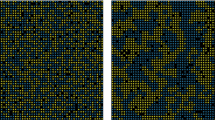
Overview
- Includes supplementary material: sn.pub/extras
Part of the book series: Lecture Notes in Computer Science (LNCS, volume 3030)
Part of the book sub series: Lecture Notes in Artificial Intelligence (LNAI)
Access this book
Tax calculation will be finalised at checkout
Other ways to access
About this book
Similar content being viewed by others
Keywords
Table of contents (13 papers)
-
Front Matter
-
Information Systems and Applications
-
Modelling, Analysis and Simulation
-
Back Matter
Editors and Affiliations
Bibliographic Information
Book Title: Agent-Oriented Information Systems
Book Subtitle: 5th International Bi-Conference Workshop, AOIS 2003, Melbourne, Australia, July 14, 2003 and Chicago, IL, USA, October 13th, 2003, Revised Selected Papers
Editors: Paolo Giorgini, Brian Henderson-Sellers, Michael Winikoff
Series Title: Lecture Notes in Computer Science
DOI: https://doi.org/10.1007/b98189
Publisher: Springer Berlin, Heidelberg
-
eBook Packages: Springer Book Archive
Copyright Information: Springer-Verlag Berlin Heidelberg 2004
Softcover ISBN: 978-3-540-22127-2Published: 25 May 2004
eBook ISBN: 978-3-540-25943-5Published: 16 June 2004
Series ISSN: 0302-9743
Series E-ISSN: 1611-3349
Edition Number: 1
Number of Pages: XIV, 210
Topics: Artificial Intelligence, Information Systems Applications (incl. Internet), Information Storage and Retrieval, User Interfaces and Human Computer Interaction, Computer Communication Networks, IT in Business



